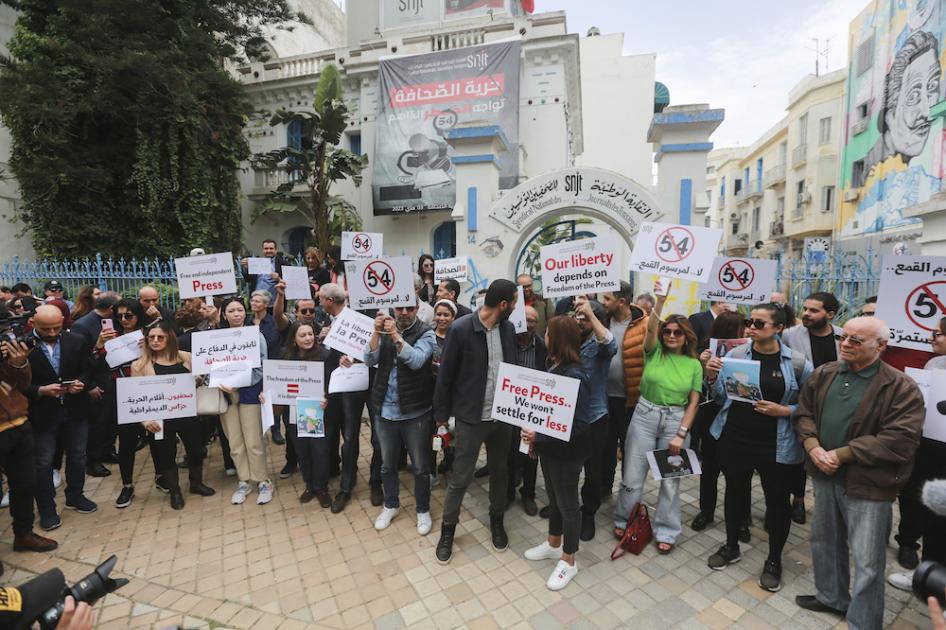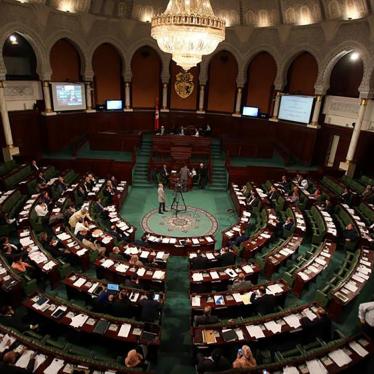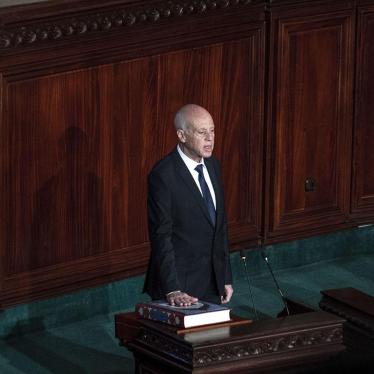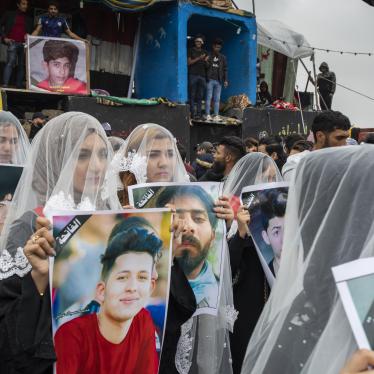(Tunis) – Tunisian authorities have sentenced two political opposition activists to prison terms for criticizing the government under a 2022 cybercrime decree, Human Rights Watch said today. Instead of using the decree to address cybercrime, the authorities have used it to detain, charge, or place under investigation at least 20 journalists, lawyers, students, and other critics for their public statements online or in the media.
Chaima Issa, a prominent figure of the opposition coalition National Salvation Front (NSF), and Sofiane Zneidi, a member of Tunisia’s largest opposition party, Ennahda, were sentenced on December 13 and 11, respectively, apparently the first two people sentenced under the decree. President Kais Saied issued Decree-Law no. 2022-54 on Combating Crimes Related to Information and Communication Systems on September 13, 2022, as part of the consolidation of his autocratic rule since he took office in July 2021. The authorities should repeal this repressive decree, release those held under it, and drop all prosecutions for peaceful expression, Human Rights Watch said.
“In the year since the president issued his cybercrime law, the Tunisian authorities have used it to stifle and intimidate a wide range of critics, while using other laws to detain some of Saied’s most serious political adversaries on dubious conspiracy charges,” said Salsabil Chellali, Tunisia director at Human Rights Watch. “Tunisia should immediately release anyone detained for their peaceful expression, drop all charges, and repeal Decree-Law 54.”
Decree-Law 54, which aims officially at “preventing and prosecuting offenses relating to information and communication systems” and setting forth provisions for authorities to “collect electronic evidence,” introduces harsh sentences for broadly and vaguely defined speech offenses, such as “spreading false information.” Since February, authorities have intensified their crackdown on critics across the political spectrum. More than 40 people have been arbitrarily detained for their peaceful activism or expression, mostly on “conspiracy” or dubious terrorism-related charges. Almost all of them have been held for months, some over a year, in pretrial detention.
The authorities have been relying on the cybercrime decree’s Article 24, which provides for a fine of up to TND 50,000 (about US$16,000) and five years in prison for using communication networks to “produce, spread, disseminate … false news, data, rumors” to “slander others, tarnish their reputation, financially or morally harm them, incite attacks against [them] or incite hate speech,” “violate [their] rights,” “harm public security or national defense, or spread terror.” The prison sentence is doubled if the offense is deemed to target a “public official or equivalent.”
On December 11, the Jendouba First Instance Court sentenced Zneidi, 63, to eight months in jail and a TND 5,000 (about $1,630) fine under Article 24, a person familiar with the file told Human Rights Watch. Zneidi, who has been in Bulla Regia jail in Jendouba governorate, has been detained since April 18, 2023. That day, National Guard officers arrested him at his home in the northwestern city of Tabarka for Facebook posts in support of Ennahda President Rached Ghannouchi after Ghannouchi was arrested on April 17, Zineb Brahmi, the party’s main lawyer, told Human Rights Watch.
During the investigation, the judicial police and later an investigative judge questioned Zneidi about his political affiliation and the “motives” behind his posts, which Zneidi quickly deleted, according to the person familiar with the file. In one post, Zneidi condemned Ghannouchi’s arrest and in another included a video clip of Ghannouchi warning that alienating opposition political movements was a “recipe for civil war.”
The judge also initially accused Zneidi of “insulting the president” under Article 67 of the Penal Code, although the president was neither named nor clearly designated in Zneidi’s posts, the same source said. Ghannouchi’s video showed him making the remarks for which he himself was detained on April 20 and could face the death penalty on charges of attempting to “change the nature of the state.”
On December 13, a military court sentenced Issa to a one-year suspended prison term, including two months under Article 24 of Decree-Law 54, six months for “inciting the army to disobey orders” under Article 81 of the Military Justice Code, and four months for “insulting the president,” according to her lawyer Dalila Msaddak, for comments Issa made during an interview in December 2022 on radio station IFM about the military’s role since Saied’s power grab. The judicial proceedings were initiated in January following a complaint by former Interior Minister Taoufik Charfeddine.
Trying Issa, a civilian, before a military court is contrary to international standards on the right to a fair trial which strictly prohibit governments from using military courts to try civilians when civilian courts can still function. In a separate case, Issa was arbitrarily detained in February for “conspiracy against state security” and conditionally released in July, pending trial.
Beside Zneidi, at least two other people were detained based on Article 24. Mohamed Zantour, a 26-year-old Ennahda supporter, was detained from April 26 to July 21 for Facebook posts, including posts he later took down, that criticized Saied, supported Ghannouchi, and denounced police brutality, his lawyer Zouheir Belhaj Amor told Human Rights Watch.
On July 21, the Sousse First Instance Court gave Zantour a suspended prison sentence of six months for “harming third parties through public telecommunications networks” under Article 86 of the Telecommunications Code and ordered his release, dropping the charges related to Decree-Law 54, Belhaj Amor said.
Yassine Romdhani, a journalist for radio station Sabra FM, was detained from October 3 to December 1 and charged by an investigative judge in the Kairouan First Instance Court for an August Facebook post criticizing Charfeddine, based on a complaint by the latter. Romdhani is provisionally free pending his trial, his lawyer Magda Mastour told Human Rights Watch.
At least six other people are being prosecuted under the same legislation, including Ghazi Chaouachi, Ayachi Hammami, Islem Hamza, and Dalila Msaddak, all lawyers; Borhen Bsaies, of IFM Radio and also a Hannibal TV host; and Sami Ben Slama, a former elections commission member.
At least 12 others are under police investigation in separate cases. They are Mehdi Zagrouba, a lawyer; Jawhar Ben Mbarek, an NSF leader; Nizar Bahloul, Monia Arfaoui, Amine Dhbaibi, Haythem El Mekki, Elyes Gharbi and Mohamed Boughalleb, all journalists; Ahmed Hamada and Yahya Shili, students; Sonia Dahmani, a lawyer and media figure; and Zaki Rahmouni, a former elections commission member.
Most of the 22 cases Human Rights Watch documented were initiated on the basis of complaints filed by government officials or entities. Justice Minister Leila Jaffel filed at least five complaints, Religious Affairs Minister Brahim Chaibi filed three, Charfeddine filed two, the Prison General Authority filed two, and a police union filed two.
In violation of the right to privacy, Decree-Law 54 also requires telecommunications companies to systematically store data on users’ identity, telecommunications traffic, and metadata for at least two years (Article 6), and empowers the authorities, upon a judicial order, to seize personal devices, track individuals, and intercept their communications to “unveil the truth” (Article 9).
Tunisia had been seeking to adopt a comprehensive cybercrime law since at least 2015. Although Decree-Law 54 was officially introduced as fulfilling this objective, it has mostly expanded the definition of criminal offenses and toughened sanctions to restrict critical online expression, breaching international standards on freedom of expression.
The authorities also continue to rely on repressive Penal and Telecommunications Codes provisions to criminalize peaceful speech.
“Saied and his government could have issued this legislation to make cyberspace and its users safer, but instead, they instrumentalized Decree-Law 54 to curb Tunisians’ rights,” Chellali said. “Under such a decree, no critic of the authorities can feel safe.”








